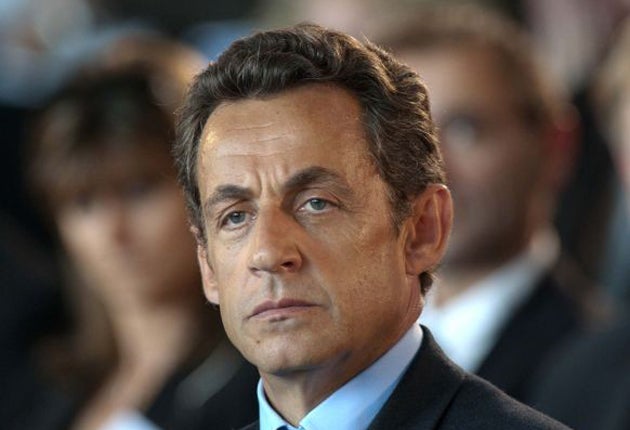Sarkozy seeks to railroad his grand vision for Paris
Go-ahead for ambitious scheme to bind capital's centre to troubled suburbs

Your support helps us to tell the story
From reproductive rights to climate change to Big Tech, The Independent is on the ground when the story is developing. Whether it's investigating the financials of Elon Musk's pro-Trump PAC or producing our latest documentary, 'The A Word', which shines a light on the American women fighting for reproductive rights, we know how important it is to parse out the facts from the messaging.
At such a critical moment in US history, we need reporters on the ground. Your donation allows us to keep sending journalists to speak to both sides of the story.
The Independent is trusted by Americans across the entire political spectrum. And unlike many other quality news outlets, we choose not to lock Americans out of our reporting and analysis with paywalls. We believe quality journalism should be available to everyone, paid for by those who can afford it.
Your support makes all the difference.A pharaonic plan to construct 80 miles of new Metro to bind Paris closer to its troubled suburbs in just over a decade was approved by the French cabinet yesterday.
The €22bn (£20bn) plan – which has caused a deep rift within the ruling centre-right party – is the first stage of Nicolas Sarkozy's declared ambition to create a unified, eco-friendly, thriving "Greater Paris" as a monument to his presidency.
The President's vision has been hailed by supporters as a 21st-century version of the rebuilding of medieval Paris by Emperor Napoleon III and Baron Georges-Eugene Haussmann in the 1850s and 1860s.
Mr Sarkozy's chosen approach – giving sweeping powers of planning and compulsory purchase to a new state-owned company – has been attacked by the left and some of his own centre-right supporters as undemocratic and a potential bonanza for property speculators.
The network of new, driverless Metro lines would provide fast links to the two main Paris airports, Charles de Gaulle and Orly. They would also, for the first time, give rapid connections from the city of Paris proper to several troubled multi-racial suburbs, including Clichy-sous-Bois and Montfermeil where the October 2005 suburban riots began.
The declared aim is to break down the invisible wall separating the French capital from its suburban towns and to generate an architectural, economic and social "renaissance" across the greater Paris area.
President Sarkozy has shelved the creation of a Greater Paris political authority, modelled on Greater London's. Instead, he has opted to create a state-owned company, the Société de Grand Paris, which will have substantial powers to build 80 miles of Metro and 50 new stations.
More controversially, the new company will be able to purchase, develop and resell large swaths of land straddling the new lines. It is estimated that this could create a network of "new" suburban towns, with a total land area amounting to twice that of Paris itself.
The implications of this idea have caused a damaging, and possibly terminal, row between President Sarkozy and his Prime Minister, François Fillon.
Broadly speaking, President Sarkozy has overruled the fears of Mr Fillon and centre-right politicians in the Paris area, and has insisted on going ahead with the plan for a state-owned development company with wide powers to purchase land. The man who devised this plan is Christian Blanc, a former boss of Air France, who was chosen by Mr Sarkozy to be minister for the "capital region". Mr Blanc, 67, who compares himself publicly to Baron Haussmann, says that his semi-private, semi-state approach will override the petty quarrels of local politicians and generate billions of euros in sales, or leases, of offices and shops to finance the new Metro lines.
Other centre-right politicians beg to differ. A Paris-area member of the National Assembly, representing Mr Sarkozy's UMP party, said: "There is no guarantee that the taxpayer will make any money out of reselling this land. The more likely beneficiaries are the people who have already been buying up the best land, because they know more or less where the lines are going to go. There is unease within the UMP that we may be seen to have unleashed a giant property speculation, which will benefit individuals who may or may not be close to senior figures in the party."
Join our commenting forum
Join thought-provoking conversations, follow other Independent readers and see their replies
Comments